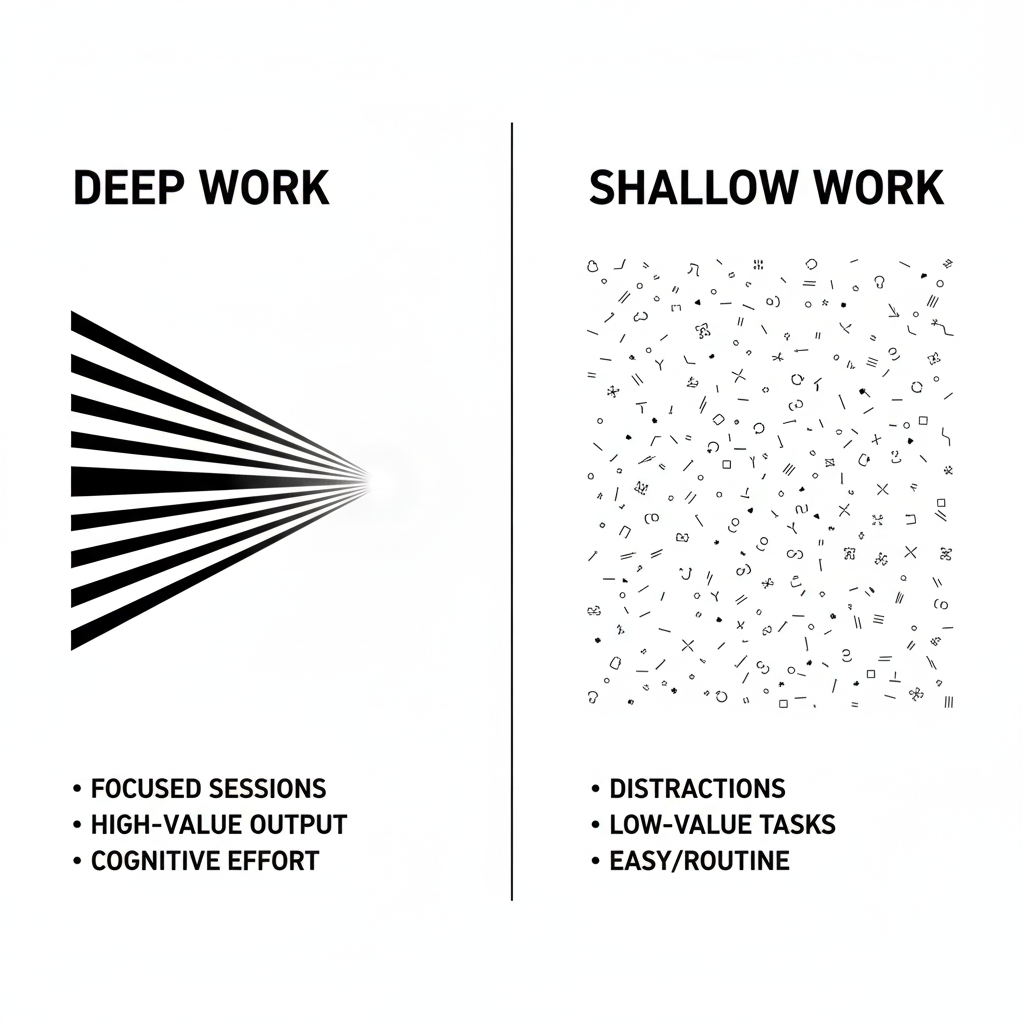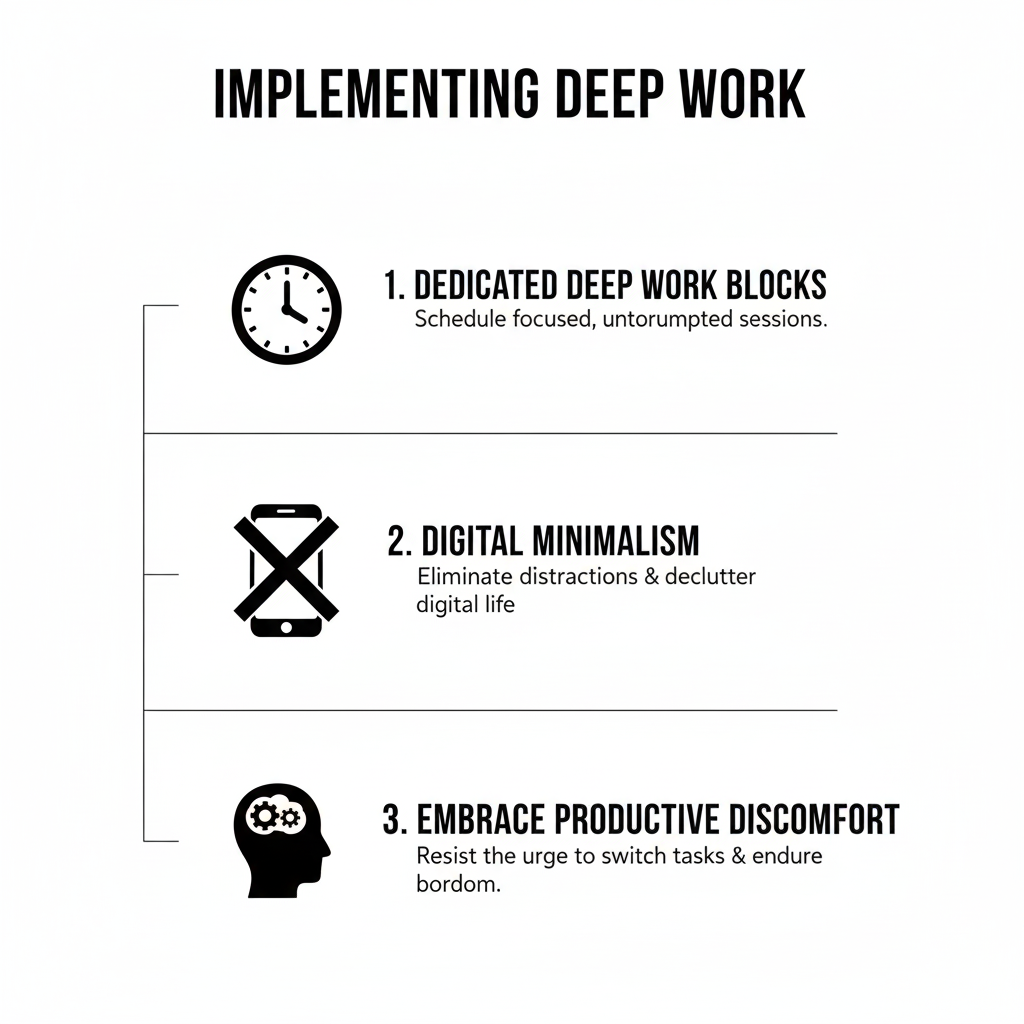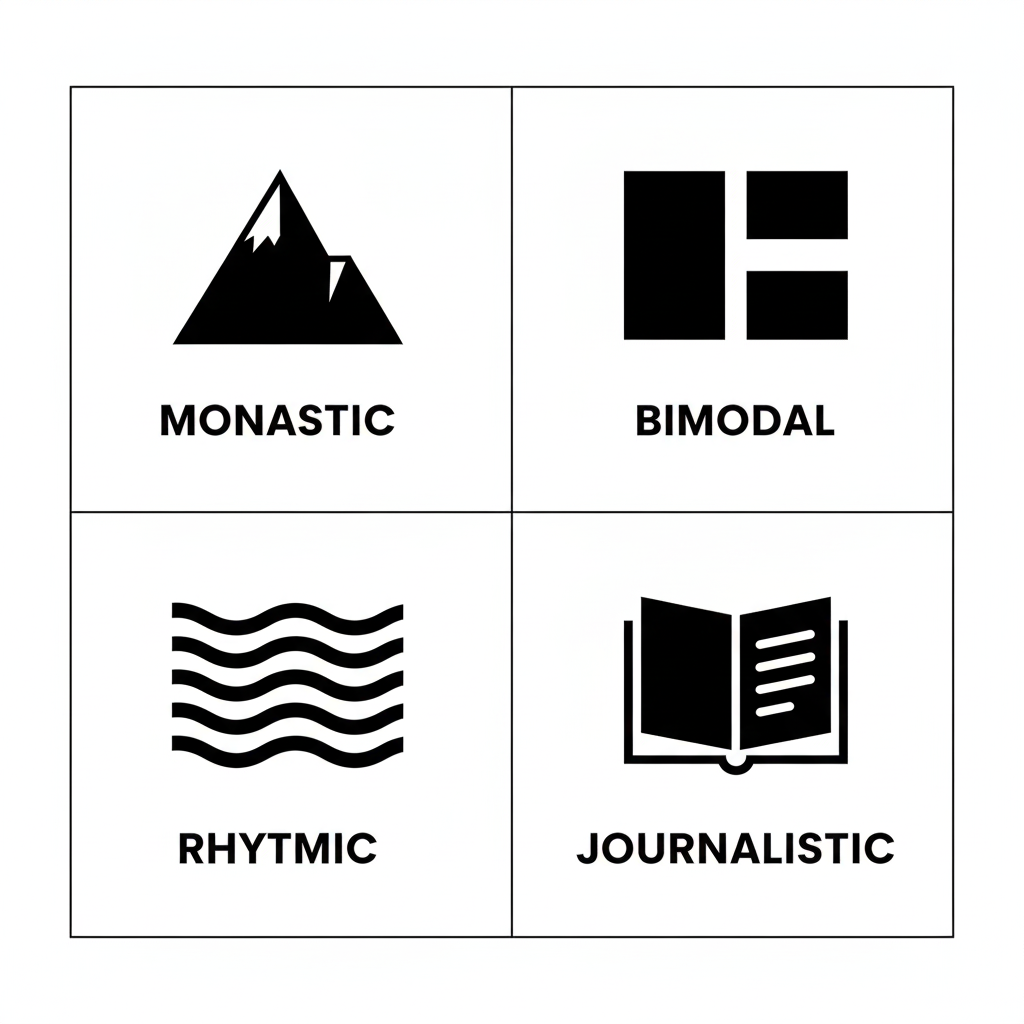The Value of Deep Work in a Distracted Era
In today’s hyperconnected world, the ability to focus deeply on complex tasks is a rare and valuable skill. With constant notifications, the allure of social media, and an endless stream of emails, many professionals find themselves drowning in shallow work—tasks that keep them busy but do not move the needle in terms of achieving meaningful results. Deep work, a term popularized by Cal Newport in his book Deep Work: Rules for Focused Success in a Distracted World(2016), offers a solution. It is the ability to concentrate without distraction on cognitively demanding tasks, leading to better outcomes and a more fulfilling professional life.

This blog will explore actionable strategies for practicing deep work, draw on real-world examples, and offer insights into how staying focused can revolutionize both personal productivity and organizational success.
The Science Behind Deep Work
Our brains are not designed to multitask effectively. According to research by the American Psychological Association (APA), shifting attention between tasks can reduce productivity by up to 40%. When you engage in deep work, you train your brain to operate in a “flow state”—a condition where you are fully immersed in an activity, leading to peak performance and creativity.
Neuroscientific studies reveal that during focused attention, the prefrontal cortex becomes highly active, aiding in problem-solving and strategic thinking. Conversely, shallow work keeps the brain in a reactive state, which hampers the development of skills and creativity. Understanding these principles highlights the necessity of carving out time for deep work.
Strategies for Cultivating Deep Work
To successfully integrate deep work into your routine, consider the following strategies:

- Designate Deep Work Blocks
Reserve specific blocks of time for deep work. During these periods, eliminate all potential distractions. Many successful individuals, such as Microsoft founder Bill Gates, have embraced the idea of “Think Weeks” to immerse themselves in focused thinking and innovation. - Eliminate Distractions
Create an environment conducive to deep work. This might include turning off notifications, using noise-canceling headphones, or working in a secluded space. Tools like Freedom or Cold Turkey can block distracting websites and apps during work sessions. - Adopt the Right Deep Work Philosophy
Cal Newport identifies four deep work philosophies:- Monastic: Eliminating all shallow work (ideal for researchers or writers).
- Bimodal: Splitting time between deep and shallow work (suitable for managers).
- Rhythmic: Scheduling deep work daily (perfect for routine-based professionals).
- Journalistic: Squeezing deep work into any available moment (challenging but rewarding for busy professionals).
- Practice Digital Minimalism
Limit time spent on non-essential digital activities. For instance, set specific times to check emails and avoid browsing social media during work hours. Steve Jobs famously focused on simplicity, both in his products and his daily routine, to avoid mental clutter. - Develop a Pre-Work Ritual
Rituals signal your brain to prepare for deep work. This might include reviewing goals, meditating for a few minutes, or organizing your workspace. For example, author Haruki Murakami follows a strict routine of waking up early, exercising, and writing to sustain creativity and focus. - Leverage Technology Wisely
Use tools like Pomodoro timers to maintain focus in shorter bursts, gradually extending these periods. Software such as Notion or Trello can help organize complex projects and reduce cognitive overload. - Track Progress and Reflect
Regularly review your deep work sessions to identify patterns and areas for improvement. Keeping a journal or using analytics tools like RescueTime can provide valuable insights into how you spend your time.

Real-World Examples of Deep Work in Action
- J.K. Rowling’s Writing Retreats: To complete the final book in the Harry Potter series, Rowling rented a suite in The Balmoral Hotel in Edinburgh, isolating herself to focus entirely on writing. Her commitment to deep work resulted in a book that sold over 8.3 million copies in 24 hours.
- Elon Musk’s Time Blocking: Musk, known for managing multiple high-stakes ventures, relies on time-blocking to focus deeply on critical tasks. By breaking his day into 5-minute segments, he minimizes distractions and maximizes output.
Overcoming Common Challenges
Even with the best intentions, sustaining deep work can be challenging. Here’s how to tackle common obstacles:
- Interruptions: Communicate your deep work schedule to colleagues and family. Place a visible sign or signal when you are in a focused state.
- Mental Fatigue: Deep work is mentally taxing. Balance it with breaks and activities that rejuvenate your mind, such as exercise or meditation.
- Resistance to Change: Start small. Dedicate just 30 minutes a day to deep work and gradually increase as you build the habit.
The Organizational Impact of Deep Work
Businesses that foster a culture of deep work can see significant benefits. For instance:
- Increased Productivity: Teams focusing on deep work achieve higher-quality outcomes in less time.
- Innovation: Encouraging employees to immerse themselves in problem-solving fosters creativity.
- Employee Satisfaction: Reducing the pressure of constant multitasking and interruptions leads to greater job satisfaction.
Companies like Google have implemented practices like “no meeting days” to allow employees to focus deeply on critical projects, demonstrating the value of such initiatives.
Conclusion: Embrace Deep Work for Lasting Success
The ability to perform deep work is a superpower in today’s distracted world. By eliminating distractions, adopting structured strategies, and committing to focused effort, you can achieve unparalleled results. Whether you’re a business leader, creative professional, or student, integrating deep work into your routine will help you unlock your full potential.
Start small, track your progress, and celebrate your wins. Over time, the practice of deep work will become second nature, setting you apart in an increasingly shallow world.
Are you ready to embrace deep work and transform your productivity? Share your experiences or challenges in the comments below. For more insights and strategies, subscribe to our newsletter or schedule a consultation to take your productivity to the next level.
